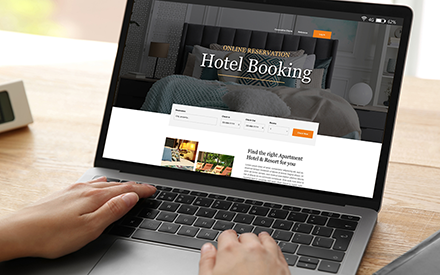According to the Guinness Book of World Records, the oldest hotel in the world is the Nishiyama Onsen Keiunkan, a Japanese resort close to Mt. Fuji. According to records, the resort was founded in 705 A.D. Though the concept of the hotel has existed at least back to the founding of this historic property, the guest experience has no doubt changed dramatically through the ages — including hotel check-in procedure.
From the time of in-person arrivals on horseback to the age of OTAs and the internet, guest expectations have evolved and risen. In 2022, there is yet another sea change occurring in consumer expectations that hoteliers around the world need to sit up and take notice of.
The COVID-19 pandemic irrevocably changed a variety of guest behaviors and expectations in the lodging and hospitality industries. Consumers now fully expect to be able to engage with hotel staff and property managers via the convenience of their personal mobile devices throughout the guest journey. This is especially true during the hotel check-in process.
The hotel check-in procedure is one of the most critical elements of any guest journey. This process is what sets the tone for a guest’s entire stay and can determine the difference between a positive and negative review.
A comprehensive and streamlined modern hotel check-in procedure includes:
- Pre-arrival notifications and communications from the property
- Same day reminders pushed directly to a guest’s personal mobile device
- A streamlined web-based digital check-in journey
- Optional upsells & add-ons
- No native app downloads
Let’s now examine each one of the above modern hotel check-in procedure elements in more detail.
Pre-Arrival Communications to Guests
The first step in a modern hotel check-in procedure occurs right after a hotel room is booked. Once a payment is processed and a reservation is made, guests should receive confirmation in the form of a text message, email or both. This message should include key information such as, hotel address, type of room booked, confirmation number and any other pertinent data points. No matter how far ahead a room is booked, it’s important to send out this information the moment a property has a reservation in its system.
Text Message Notifications on Arrival Day
A modern hotel check-in process leans heavily on the use of technology to streamline hotel arrivals and minimize administrative work for both staff and guests. On the day a guest is set to begin their stay at a property, hoteliers should ensure they receive a text message reminding them of their arrival time and any other important information. Hotel operators that wish to provide a seamless experience to their guests should also include a link to a digital check-in flow in that message.
A Web-Based Check-In Process
As mentioned above, hoteliers that want to offer a modern hotel check-in procedure to their guests should include a link to a digital check-in flow in their arrival-day text message. This approach to checking in guests has several advantages over the more traditional method of processing each guest, person by person, at the front desk.
Benefits of a digital check-in flow for your hotel guests include:
- Guests can check-in from anywhere at any time after they receive their dedicated check-in link.
- Hoteliers can design the check-in flow to collect key guest information that may not have been captured when the reservation was made, such as name, email address and phone number (this is especially important if a guest came through an OTA). All of the information captured during the check-in process can be used to promote loyalty programs and power marketing campaigns.
- The more guests that check-in through a digital flow, the fewer will show up at the front desk looking to sign a registration card and hand over credit card information. This results in shorter lines in the lobby and reduces the burden on front desk staff, enabling them to spend more time responding to guest inquiries.
It’s important to remember that a modern hotel check-in procedure will rely on a web-based solution for contactless check-in as opposed to a native app. This is due to the fact that native apps require guests to take the cumbersome step of downloading an app from an app store onto their devices. Web-based solutions do not require guests to download anything, which means a check-in process that relies on this type of technology can be easily accessed by any guest.
Upsells & Guest Service Add-Ons
No modern hotel check-in process would be complete without the presentation of upsells to guests. A comprehensive digital check-in solution should include the ability to offer room upgrades, pet services, spa packages, parking permits and more seamlessly as a guest makes their way through the user flow.
Offering upsells and add-ons to guests in this way has been shown to increase ancillary revenue at all kinds of properties (luxury, full-service and limited-service).
Protip: It’s important to remember that upsells can be offered at any time during the in-stay experience.
Avoid Native Apps & Opt for Web-Based Solutions
If you are planning to deploy a contactless check-in solution at your property, it’s important to understand the difference between your two primary technology options — native apps and web-based solutions.
Traditionally, web-based solutions (those that can be accessed through a device’s browser) have been seen as relatively simple in functionality when compared to what can be created using a native app. However, web-based solutions have vastly improved in quality over the past few years thanks to improvements in mobile browsers.
Today, both native apps and web-based solutions offer high quality user experiences, but apps still retain a key barrier to entry. Modern consumers are a lot less inclined to download a native app they’re only likely to use a handful of times, which gives an unequivocal advantage to web-based solutions that can be accessed immediately.
Conclusion
The modern hotel check-in process is, above all else, streamlined. Today’s guests expect to be able to engage with the hotels they stay at on their own terms through their own personal devices. Many will still want to have pleasant face-to-face interactions with the front desk and other staff members, but they want these to be interactions to be based on something more meaningful than filling out paperwork. Hoteliers that are looking to boost satisfaction scores and improve guest reviews should find ways to meet these modern guest expectations with nimble technology solutions their customers will love.










.webp)




.avif)
